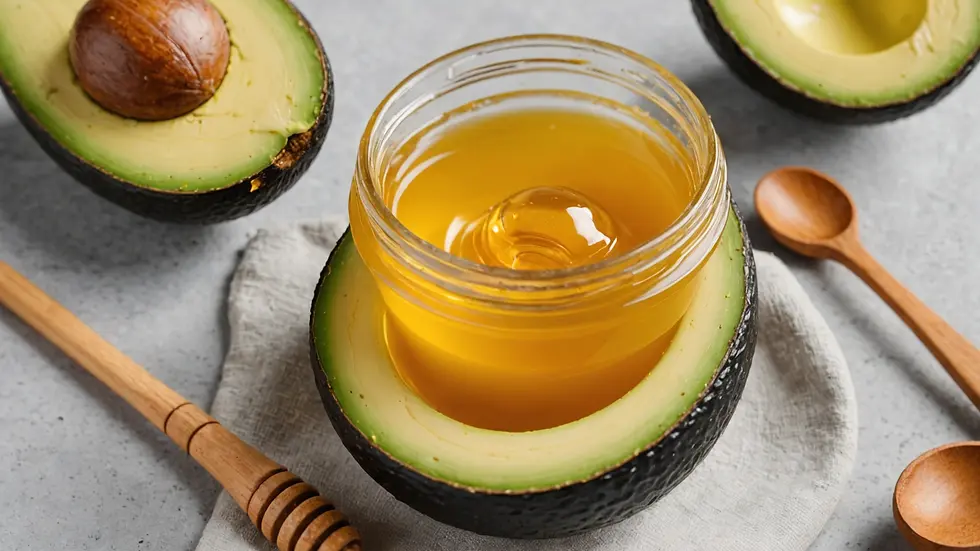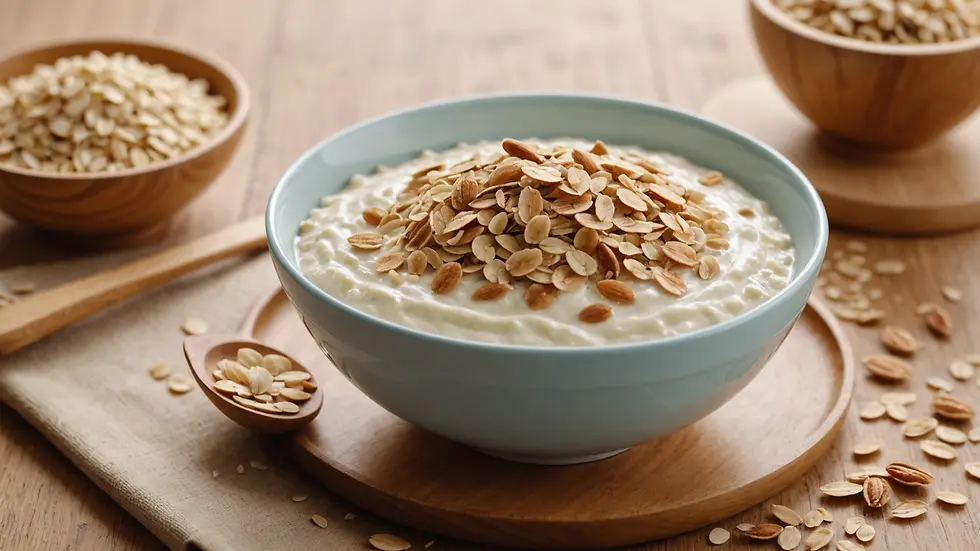DIY Skincare: Homemade Masks for Radiant Winter Skin
- rhapsodylegacy
- Dec 4, 2024
- 6 min read
Updated: Dec 10, 2024
As winter arrives, the chill in the air and the heating indoors can wreak havoc on our skin. The result is often dryness, irritation, and a dull complexion. But don’t worry! You can easily create nourishing DIY masks from common kitchen ingredients that hydrate and rejuvenate your skin. This comprehensive guide will explore various homemade masks tailored for winter skincare, helping you maintain healthy and glowing skin throughout the season.
Why DIY Skincare Matters
DIY skincare allows you to control the ingredients you apply to your skin. Many commercial products contain artificial additives and harsh chemicals, but homemade masks can be customized for your unique skin needs. Moreover, making your own skincare can save you money; consider that some store-bought masks can cost upwards of $30, while homemade versions often cost less than $5.Creating your own beauty products can also be a fun and relaxing activity. During the shorter, darker days of winter, spending time on self-care is more important than ever. It’s a small yet rewarding way to enhance your mood and well-being.
Understanding Winter Skin Challenges
Winter can be particularly harsh on your skin due to several factors:
Low Humidity: The cold air outside and the dry heat indoors strip moisture from your skin, leading to dryness and flakiness.
Harsh Weather: Wind and cold temperatures can irritate the skin, causing redness and sensitivity.
Hot Showers: While a hot shower feels great in winter, it can further dehydrate your skin by washing away natural oils.
Understanding these challenges is the first step toward creating effective homemade masks that target specific winter-related skin concerns.
Essential Ingredients for Winter Masks
Before diving into specific recipes, let’s explore some key ingredients commonly used in DIY skincare masks:
Honey: A natural humectant that attracts moisture to the skin while possessing antibacterial properties.
Avocado: Rich in healthy fats and vitamins, avocado nourishes and hydrates dry skin.
Oatmeal: Soothes irritation and provides gentle exfoliation; it’s perfect for sensitive skin.
Yogurt: Contains lactic acid, which helps exfoliate dead skin cells while moisturizing the skin.
Coconut Oil: A deeply hydrating oil that locks in moisture and has antibacterial properties.
Banana: Packed with vitamins A, B, and E, bananas help moisturize and soften the skin.
Other Common Kitchen Ingredients for DIY Skincare Masks
In addition to the above ingredients, many other common kitchen staples can enhance your DIY skincare routine:
Olive Oil: Excellent for hydration; it contains antioxidants that nourish the skin.
Turmeric: Known for its anti-inflammatory properties; it can brighten the complexion.
Green Tea: Rich in antioxidants; it helps soothe irritated skin and reduces puffiness.
Aloe Vera: Provides soothing hydration; great for calming sunburns or irritated areas.
Cocoa Powder: Packed with antioxidants; it helps protect against environmental damage.
DIY Mask Recipes for Radiant Winter Skin
1. Hydrating Honey and Avocado Mask
Ideal for: Dry, flaky skin
Ingredients:
1 ripe avocado
2 tablespoons honey
1 tablespoon olive oil (optional)
Instructions:
Mash the avocado in a bowl until smooth.
Stir in the honey and olive oil if using until well combined.
Evenly apply the mixture to your face, steering clear of the eyes.
Leave it on for 15-20 minutes, then rinse with warm water.
Benefits: This mask rehydrates and revives your skin, providing nutrients that support a healthy glow. Many users report feeling their skin looks almost 90% more hydrated after just one application.

2. Soothing Oatmeal and Yogurt Mask
Ideal for: Sensitive or irritated skin
Ingredients:
1/2 cup oatmeal
1/4 cup plain yogurt
1 teaspoon honey
Instructions:
Blend the oatmeal into a fine powder using a food processor.
In a bowl, mix the powdered oatmeal with yogurt and honey until a paste forms.
Apply evenly to your face and let it sit for about 20 minutes.
Rinse with warm water while gently massaging your skin.
Benefits: This easy-to-make mask helps reduce redness and irritation, making it a fantastic option when winter dryness strikes.

3. Nourishing Banana and Coconut Oil Mask
Ideal for: Dry or combination skin
Ingredients:
1 ripe banana
1 tablespoon coconut oil
1 tablespoon honey (optional)
Instructions:
Mash the banana in a bowl until smooth.
Mix in the coconut oil and honey if desired.
Apply the mask to your face and let it sit for about 20 minutes.
Rinse with warm water and gently pat your face dry.
Benefits: This nourishing mask hydrates and softens your skin, leaving it feeling silky smooth. Many users report seeing softer skin immediately after using it.

4. Brightening Citrus Mask
Ideal for: Dull or uneven skin tone
Ingredients:
1 tablespoon orange juice
1 tablespoon honey
1 tablespoon yogurt
Instructions:
In a bowl, mix orange juice with honey and yogurt until smooth.
Apply to clean skin, avoiding the eye area.
Leave on for about 10 minutes before rinsing off.
Benefits: The vitamin C from orange juice brightens the complexion while yogurt gently exfoliates.
5. Revitalizing Coconut Oil Mask
Ideal for: All skin types needing hydration
Ingredients:
2 tablespoons coconut oil
1 tablespoon honey
A few drops of essential oil (optional)
Instructions:
Melt coconut oil if solidified (you can do this by placing it in a warm bowl).
Mix in honey and essential oil if using.
Apply to clean face and neck, massaging gently.
Leave on for 20 minutes before rinsing with warm water.
Benefits: Coconut oil deeply hydrates while honey adds moisture retention.
How Often Should I Use These DIY Masks for Optimal Results?
For optimal results, it's recommended to use these masks once or twice a week. Consistency is key when it comes to skincare—regular application can lead to noticeable improvements in texture and hydration levels over time.
Tips for Best Results with DIY Masks
To get the most out of your homemade masks, consider these tips:
Patch Test First: Always perform a patch test on a small area of skin to check for allergic reactions before applying any new ingredient to your face.
Stay Consistent: For optimal results, use these masks once or twice a week.
Storage Tips for Homemade Masks:
If you have leftovers, store them properly in an airtight container in the refrigerator for up to three days but fresh masks are always preferred!
Always check for any signs of spoilage before applying stored masks.
Are There Any Ingredients I Should Avoid in Homemade Skincare Masks?
While many kitchen ingredients are beneficial for skincare, some should be avoided:
Citrus Peels or Juices on Sensitive Skin: They can cause irritation or photosensitivity when exposed to sunlight.
Harsh Exfoliants (like sugar or salt) if you have sensitive or broken skin as they may exacerbate irritation.
Essential Oils without Dilution: Some essential oils can be irritating if not properly diluted with carrier oils like coconut or olive oil.
Can I Combine Different Ingredients to Create a Custom
Mask for My Skin Type?
Absolutely! Combining different ingredients allows you to tailor masks specifically to your needs:
For oily or acne-prone skin, consider mixing yogurt with turmeric and tea tree oil.
For dry or mature skin types, blend avocado with honey and olive oil for extra nourishment.
Experimenting with combinations lets you create personalized treatments that address multiple concerns at once!
Additional Winter Skincare Tips
In addition to using homemade masks, consider these tips for maintaining radiant winter skin:
Stay Hydrated Internally: Drink plenty of water throughout the day to keep your skin hydrated from within.
Moisturize Regularly: Use a rich moisturizer after cleansing to combat dryness caused by cold weather.
Limit Hot Showers: While tempting during winter, hot showers can strip natural oils from your skin; opt for lukewarm water instead.
Use a Humidifier: Adding moisture back into dry indoor air can help prevent your skin from drying out.
Wear Sunscreen Daily, even in winter! UV rays are still present during cloudy days; protect your skin with SPF daily.
Conclusion
Winter doesn’t have to mean dull or dry skin! With these DIY skincare masks tailored for winter conditions, you can pamper yourself at home using natural ingredients that nourish and rejuvenate your complexion. By incorporating these simple recipes into your skincare routine along with proper hydration practices, you’ll be well on your way to achieving radiant winter skin. Embrace the beauty of winter while taking care of yourself—your skin will thank you! This season, treat yourself to some much-needed self-care through DIY skincare that reflects nature's offerings—your glowing complexion will be proof of that care! This expanded article now includes additional information about common kitchen ingredients used in DIY skincare masks as well as guidelines on usage frequency, ingredient avoidance, customization options, storage tips, and more! Let me know if you need any further adjustments!



Comments